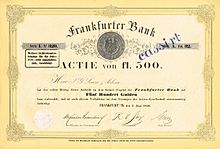Frankfurter Bank
The Frankfurter Bank was in 1854 as a private central bank of the Free City of Frankfurt founded. She later concentrated on asset management before lending dominated from 1948 onwards . In 1970 the Frankfurter Bank merged with the Berliner Handels-Gesellschaft to form BHF-Bank . This was the largest bank merger in German post-war history to date .
history
Central bank
In order to facilitate the circulation of money among the banks in Frankfurt am Main and with their business partners, some Frankfurt bankers, including the Bethmann brothers , Grunelius & Co. , Rothschild & Sons , and the Frankfurter Vereinskasse founded in 1852, decided to found a Frankfurt central bank . On the basis of an application submitted by the eight Frankfurt founding banks in 1852 and subsequent further agreements, on April 11, 1854 the mayor and the city council granted the bankers the license to found the Frankfurter Bank corporation , later simply called Frankfurter Bank . Peter Carl Grunelius , Mayer Carl Freiherr von Rothschild , Philipp Christian Wilhelm Donner , Jacob Rigaud and Jacob Carl de Bary formed the first bank committee. As part of the IPO , 20,000 shares of 500 guilders each were issued, making the initial capital 10 million guilders.
The city gave the new institute the right to issue guilders in southern German association currency as a central bank . With this important role in mind, Frankfurter Bank should be very solid in its business activities and stay away from risk. The deposit and loan business was therefore not allowed.
As the central bank of the Frankfurt private banking houses, the bank soon rose to become one of the leading banks in southern Germany . It became one of the most important money equalization offices between northern and southern Germany.
The banknotes were printed by Dondorf & Naumann .
Asset management bank
The standardization of currency relations through the establishment of the Reichsbank in 1875 severely restricted the Frankfurter Bank as a private central bank in its original task. It was only allowed to issue banknotes with a face value of 100 marks and more. On the other hand, the new legal regulations allowed the acceptance of interest-bearing deposits , in which the bank found a replacement for the shrunk banknote issue in the following years.
The progressive restrictions on the issue of banknotes by the Reichsbank prompted the Frankfurter Bank to give up its banknote privilege in 1901. At the same time, the Prussian state , to which Frankfurt had belonged since 1866, granted her the privilege of ward security , which formed the basis of her business activities until the end of the Second World War . The ward security meant that the bank was allowed to act as depository for funds that were to be stored particularly securely. The central bank became an asset management bank with extensive custody and securities business . The bank was also very active in money trading between credit institutions . The granting of loans to industry and foreign and issuing business remained taboo.
Change to a credit bank
In 1931, in contrast to many other banks, the Frankfurter Bank , which was headed by Hans Heinrich Hauck , did not suffer from financial difficulties during the global economic crisis , precisely because it had no credit relationships with industry. After the Second World War and the currency reform in 1948, the house was completely redesigned. After the entry of senior staff at the former Reichs-Kredit-Gesellschaft under the leadership of Hermann Jannsen , the Frankfurter Bank transformed into a supra-regional credit bank. Business with large German and foreign companies as well as international commercial business grew particularly strongly. In 1962, the bank, which until then had no branches , set up branches for the first time .
people
- Hanns Schroeder-Hohenwarth , member of the board and later BdB president
- Rolf-Dieter Postlep , apprentice banker, former president of the University of Kassel
- Rudolf Winterwerb , director and board member of Frankfurter Bank from 1899 to 1931
Web links
- History of BHF-Bank
- Entry of private banks in Meyer's Konversationslexikon 1885ff.
- Early documents and newspaper articles on the Frankfurter Bank in the 20th Century press kit of the ZBW - Leibniz Information Center for Economics .
Individual evidence
- ^ Jörg Nimmergut: Historical securities. Collect meaningfully - win guaranteed . Battenberg, Augsburg 1991, ISBN 3-89441-042-6 , p. 83.
- ↑ a b c d Erich Erlenbach: An anniversary in the year of the golden mean. The Berliner Handels- und Frankfurter Bank celebrates 25 years of its history . In: Frankfurter Allgemeine Zeitung of April 12, 1980, p. 17.
- ↑ Allgemeine Zeitung München, Jg. 1854, p. 1966, online
- ↑ When Frankfurt was still issuing banknotes . In: Vossische Zeitung , April 6, 1929, p. 15.
